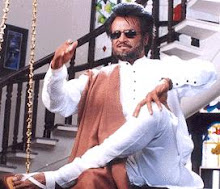Yoraanar!
This article was first published on mylaw.net
***
I read somewhere that to run a successful Tamil mega-serial, you need only three sets – a gaudy house, a police station and a hospital. Then, you find a film actress of yesteryear, a few buxom middle-aged women, hot-blooded men, Ram Gopal Varma dropouts and rejects, and put them all in a not-so-merry-go-round from home to hospital, hospital to police station, and back home. Make some characters run anti-clockwise, some oscillate between two points, and others (like nurses, grandmothers or constables) stay put. Amidst all this, you can have the police and the RGV goons mete out guerrilla justice, reinventing procedural law in the process.
In one such prime-time soap, misleadingly titled “Thendral”, meaning “lilting, gentle breeze”, the lead character, misleadingly called Tamizharasan (he speaks mostly English) is set to marry a rich girl, Charu, when he is falsely accused of embezzlement. Instead of fighting it out in the courts, Tamizh decides to nab the real culprit. Unsurprisingly, he finds himself in deeper shit. Charu’s father engages a top-notch criminal lawyer – a man dressed in white-and-white, wears bands and a black coat even when he’s at his client’s house, and carries around an unnaturally slim case bundle at all times – who gets Tamizh his bail from the High Court. He’s paid a judge off, we hear.
Sadly, Tamizh dumps Charu for his true love, Tulasi. Charu’s father is livid. He calls up the criminal lawyer and says, “Saar, please cancel his bail!” The criminal lawyer cancels the bail (in the police station!) by simply taking back a piece of paper from the concerned inspector. Tamizh finds himself arrested, and detained at the police station for two whole weeks!
In another serial, “Thangam”, (starring yesteryear sex-bomb, Ramya Krishnan, as a devout, subservient, role model, at once an IAS officer and a doting wife) the heroine’s father has two wives – both of whom he loves and treats equally. In a kinky turn, the wives love each other too. It is one big happy family. Almost.
Ramya and her sisters, born to the second wife, are detested by their half-brother, who files a suit in the local court. On the anointed day, the entire cast gathers in a court hall, when the judge enters ceremoniously. The judge says, “May the case for today be heard.” The dafedar, holding his sceptre aloft, hollers, “Thiru Karthikeyan! Karthikeyan! Karthikeyan!” Karthikeyan, the son, stations himself in the witness box and puts forth his case.
He wants to be declared the sole heir to the property. He wants the court to declare that Ramya and her sisters are not his father’s daughters at all. “They must be thrown out of society,” he declares, self-righteously in court, and then mumbles to his lawyer, “Saar, please tell him the legal point.” To which the lawyer, who was sitting with three others in the semi-circular table, rises and says, “Yoraanar, according to Indian law, a man can have only one wife.” The judge nods gravely, and jots down something in a notebook.
Karthikeyan continues. He wants the property to vest in him immediately, before his father writes his will. He offers to give his father and the first-wife 10,000 rupees each month for their subsistence. The first-wife, unable to bear the ignominy, faints. The second-wife consoles her.
At this point, the judge declares, “Let the accused be brought.” The dafedar announces, “Thiru Selvaraghavan! Selvaraghavan! Selvaraghavan!” The father, a village headman, enters the opposing witness box. The camera swooshes from one box to another, accompanied by pounding music.
The lawyer begins his cross-examination, “Do you admit that you have two wives?” The father admits. “Do you admit that it is against the law to have two wives?” The father admits. “Then do you admit that your second wife has no interest in your property?” He denies.
The tension is insurmountable. The father, calmly explains, “The law might be against me. But the law is wrong. My ancestors have been headmen for generations. I have been a headman for fifty years now. In these years, I have given large parts of my property to the Amman temple, the local school, to poor people. I have shared my wealth with everyone in this village. Nobody questioned me then!” Where is he going with this, I wonder. “Today, my own son, my own blood, tells me that I cannot share my love between two women? He tells me that the law doesn’t allow it? Yoraanar,” he addresses the Bench, “You sit in that chair not only to enforce the law, but to do justice. Tell me, now, which of us is just?” The judge nods and makes furious notes, before ruling in favour of justice over black-letter law.
This is what the courts should do. No plaint, written statement, interim prayers and applications, exhibits, proof affidavits, typed sets, precedents. No putting-up, mentioning, batta, coding sheet, docket, SR number, application number, witness number, adjournment, hearing date. No section 20, order 1, rule 10(2), CPC, CrPC. Just a one-on-one face-off.




7 replies:
*chuckle* tee hee.
Brilliantly funny!
Yoraanar, this was hilarious! You have a special gift for situational observation.
Anand
Sooo funny !! Couldnt control my laughter while i was reading this in the train.
I must say I could not deconstruct 'Yoranaar' at all, although I must have heard it a million times!
Had great fun reading it :) Thanks.
Maya
Very well written! Made for some great reading on a depressing afternoon at work.
Haha...LawL
Post a Comment